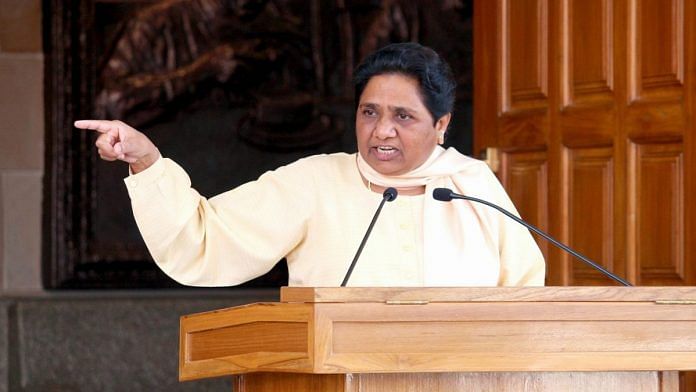Mayawati’s party has decided to support candidates from hated rival SP in two Lok Sabha bypolls in Uttar Pradesh, to defeat the BJP.
The assembly poll results declared Saturday saw the BJP make history by destroying a communist fortress in Tripura, and the numbers in Nagaland mean that the party could now be ruling 21 states – whether on its own or in alliance.
For a long time, there has been much debate on whether opposition parties should come together to form a grand alliance to counter the rise of the BJP. After the Uttar Pradesh assembly elections in 2017, there were glimpses of this when all major political leaders including those belonging to the Bahujan Samaj Party (BSP) and the Samajwadi Party (SP) met at then-Congress president Sonia Gandhi’s residence, but nothing concrete happened.
No alliance in India can be fruitful without succeeding in UP, which sends 80 members to the Lok Sabha. In fact, the BJP and its allies won 73 seats in the state in 2014, which means that to come back to power in 2019, the BJP will have to match this unprecedented success.
Why the BSP has decided to support the SP
Since the 1990s, the SP and the BSP have been the dominant parties in UP; no third player was powerful enough to take power away from them. But the 2014 general elections changed the scenario, as the BSP was reduced to nil and the SP to just five seats – huge setbacks for both parties.
They thought that things would be different in the state elections in 2017, but the BJP swept to power, forcing the two bitter rivals to think of joining hands in alliance. When Mayawati raised the issue of EVM tampering, SP leader Akhilesh Yadav backed her.
The BJP played a religion and caste card in 2017, and its well-fabricated coalition of non-Jatav SCs, non-Yadav OBCs and upper caste Hindus delivered a verdict against the Jatav and Muslim-Yadav voters of the BSP and the SP respectively. If the Jatav-Yadav-Muslim voters combine, they can form an unbeatable alliance.
A major reason for the alliance now, probably the most important reason, is that UP seems to be going back to the Kalyan Singh era, when Hindutva politics was at its peak, and there was a rise in social tensions and a rise in caste atrocities against Dalits, Yadavs and Muslims.
At that time, the leaders of the BSP and the SP, Kanshiram and Mulayam Singh Yadav, formed a social alliance to defeat the BJP – giving rise to the famous slogan ‘Mile Mulayam Kanshiram, hawa ho gaye Jai Shri Ram’.
Is it a full-fledged coalition?
It’s too early to conclude, given that the BSP has just decided to support SP candidates in two Lok Sabha bypolls. The success of this experiment will decide the future. The BSP has indicated, by way of its alliance with the Janata Dal (Secular) in Karnataka, that it is ready for coalition politics.
This could be the start of a non-BJP, non-Congress alliance, which could mark the beginning of a third front for the 2019 general elections. Still, this picture will become clearer when the BSP shows its hand in the Madhya Pradesh and Chhattisgarh assembly polls later this year.
Mayawati herself said in her brief press conference that it’s only natural that if the BSP is not contesting, it will ask its voters to support the strongest candidate against the BJP. Until and unless there’s an official division of seats, the coalition cannot be considered official.
Impact of a possible coalition
The SP and the BSP received 28 and 23 per cent of the vote respectively in the 2017 assembly elections. If the parties can transfer their votes completely to each other, they can form an unbeatable coalition in UP with 51 per cent, which would mean the BJP would go from 71 seats to less than 10, rendering its dreams of retaining power in the 2019 Lok Sabha elections impossible.
The impact will be felt in neighbouring states too. In Bihar, the RJD is recovering quickly from its chief Lalu Prasad Yadav going to jail, and with former CM Jitan Ram Manjhi now joining hands with it, Mahadalit voters will strengthen the grand alliance.
In Madhya Pradesh, the BJP is facing a 15-year anti-incumbency, and the impact of an SP-BSP alliance will be felt in border areas, which will certainly impact the BJP’s tally.
Possible drawbacks
The SP and the BSP have been hated rivals for a long time, and local leaders will have their own interests, which could be affected if there’s a coalition. The BJP will try to portray that all parties are uniting to defeat their common ‘enemy’, which could help it get support from fence-sitting voters.
The potential alliance has opened the door to a whole new world of possibilities for Indian politics.
Devashish Jarariya is a political analyst & social media activist at BSP




Imaginary bravado!
Mayawati’s support to SP is a clear quid pro quo for their support to her Rajya Sabha ambitions; nothing more, nothing less. Mayawati is a very difficult person to get long with. The drip drip drip of leaders leaving BSP is proof of that. This is an alliance of convenience and not of conviction.
In a first past the post system, 40% is sufficient to win an election. The spectacular result in 2014 came with just 31%. It is only natural for opposition unity to increase when one party becomes dominant. However, the exceptional will to power now being seen, from not just fighting to win an election but forming governments against the grain of the verdict, even in denying space to political competitors which they are entitled to in a federal polity, is bound to push the index of opposition unity up. In UP, that could lead to a formal alliance between the SP, BSP and the Congress in a small supporting role.
Absolutely.